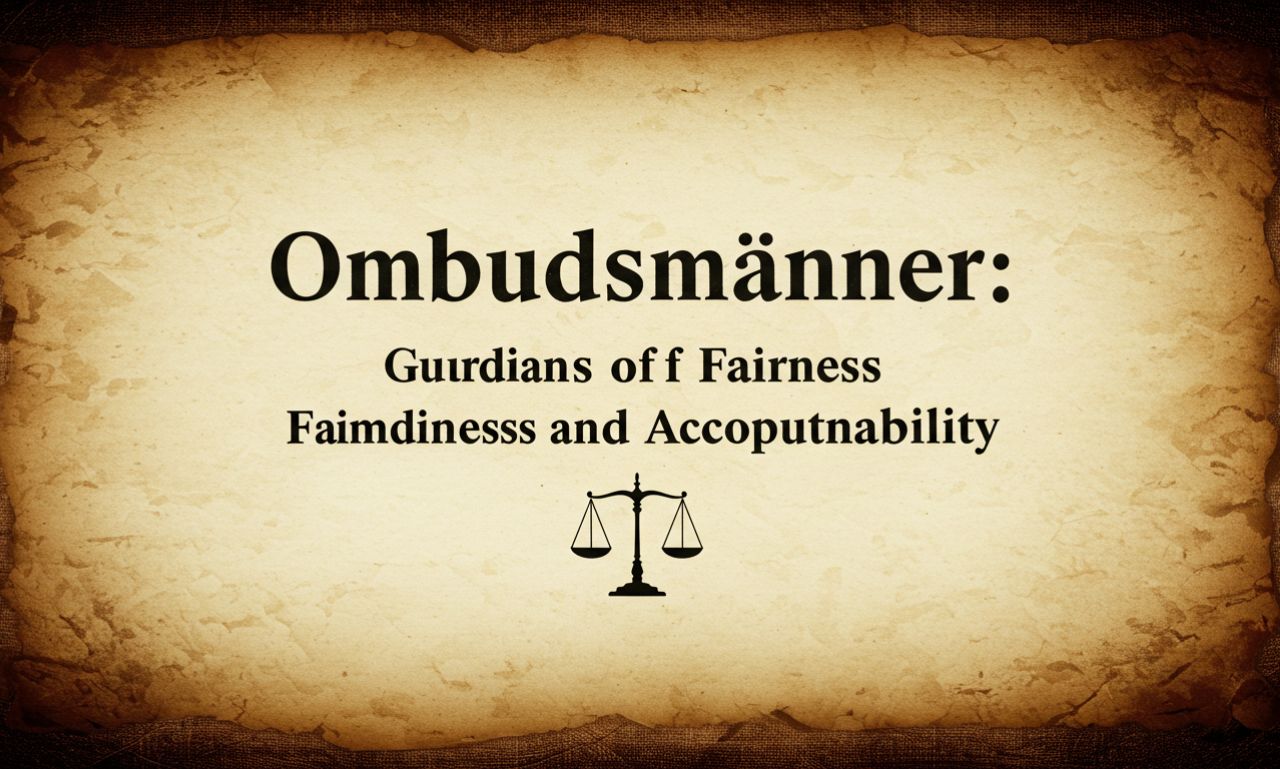In an era where transparency, justice, and ethical conduct are more important than ever, the role of ombudsmänner has become increasingly significant. Derived from Scandinavian roots, the concept of the ombudsmann (singular) or ombudsmänner (plural) refers to an independent official appointed to investigate complaints against public or private institutions. These figures serve as impartial watchdogs, ensuring that citizens, employees, and consumers have a fair channel to voice grievances and seek resolution.
Understanding the Concept of Ombudsmänner
The term ombudsmänner finds its origins in Sweden, where the first Parliamentary Ombudsman was established in 1809. Since then, the model has spread across the world, adapting to various legal systems, organizational structures, and cultural contexts.
At its core, the ombudsmann functions as a neutral mediator between individuals and institutions. Whether working in government, corporations, educational institutions, or media organizations, ombudsmänner play a vital role in promoting accountability and improving public trust.
The Evolution and Global Spread of Ombudsmänner
Over the past two centuries, the idea of having an independent, accessible authority to address complaints has taken root in multiple countries. From Canada to South Africa, and from Germany to New Zealand, ombudsmänner have become central to regulatory frameworks and corporate governance.
In Germany, for example, the role of ombudsmänner has expanded in areas like banking, healthcare, and public administration. German consumers can approach these officials to resolve disputes without costly legal proceedings. Similarly, in the European Union, the European Ombudsman addresses maladministration issues within EU institutions, making sure that transparency and fairness are upheld at the supranational level.
Roles and Responsibilities of Ombudsmänner
The responsibilities of ombudsmänner can vary depending on their field of operation, but some core duties remain consistent:
-
Investigating Complaints: receive and assess complaints from individuals who believe they have been treated unfairly or subjected to misconduct.
-
Recommending Remedies: Though they usually cannot enforce rulings, offer well-reasoned recommendations for corrective action.
-
Promoting Fair Practices: Through audits, policy reviews, and regular reporting, they identify systemic issues and advocate for ethical standards.
-
Educating the Public: Many ombudsmänner publish guides, organize public forums, and raise awareness about rights and grievance procedures.
Ombudsmänner in Different Sectors
1. Government and Public Administration
In public institutions, monitor how policies are implemented and whether civil servants adhere to laws and codes of conduct. Citizens often rely on them to resolve issues such as bureaucratic delays, discrimination, or wrongful penalties.
2. Corporate Sector
Many companies, especially in finance and telecommunications, employ internal ombudsmänner to handle client complaints. These officials also help enforce ethical conduct within the organization, making sure employees are protected from harassment or retaliation.
3. Media and Journalism
Media ombudsmänner serve as ethical overseers, reviewing concerns about bias, misinformation, or unfair reporting. By addressing complaints transparently, they help maintain public confidence in journalism.
4. Education and Academia
Universities and schools have begun to integrate into their administrative frameworks. They provide support to students and staff, particularly in cases involving academic misconduct or administrative injustices.
Qualities and Skills of Effective Ombudsmänner
To be effective in their roles, ombudsmänner must possess a unique blend of personal and professional qualities:
-
Impartiality: A commitment to neutrality is crucial for gaining trust from all parties.
-
Integrity: Upholding ethical standards regardless of external pressures is key.
-
Analytical Thinking: The ability to evaluate complex cases and identify root causes.
-
Strong Communication: Articulating findings and recommendations clearly and diplomatically.
-
Confidentiality: Respecting the privacy and dignity of all stakeholders involved.
Benefits of Having Ombudsmänner in Institutions
The presence of ombudsmänner in any organization provides several advantages:
-
Increased Trust: Stakeholders feel more confident when they know there is an independent mechanism to address concerns.
-
Reduced Legal Costs: Many disputes are resolved informally, avoiding lengthy and expensive litigation.
-
Improved Policy Making: Systemic issues identified by often lead to policy improvements and better governance.
-
Higher Employee Morale: Internal ombudsmänner can help build a culture of fairness and respect in the workplace.
Challenges Faced by Ombudsmänner
Despite their vital role, ombudsmänner face several challenges:
-
Lack of Authority: Many lack the legal power to enforce their recommendations, making them dependent on voluntary compliance.
-
Resource Constraints: Limited staff and funding can hamper their effectiveness.
-
Resistance from Institutions: Organizations may be reluctant to cooperate or accept criticism.
-
Public Awareness: In some regions, people remain unaware of the services provide.
The Future of Ombudsmänner in a Digital Age
As technology reshapes communication and data sharing, ombudsmänner must also evolve. Digital platforms allow for faster complaint processing and greater accessibility. At the same time, they must deal with issues like cyber complaints, AI decision-making, and digital rights. The challenge ahead lies in adapting their traditional roles to the fast-paced, often opaque world of digital governance.
Conclusion
In a world where power dynamics can often lead to injustice or neglect, serve as vital protectors of the individual voice. Whether in public administration, business, media, or academia, they ensure accountability, offer redress, and help maintain the moral compass of institutions. As the demand for transparency and fairness continues to grow globally, so too will the importance and reach of ombudsmänner.
